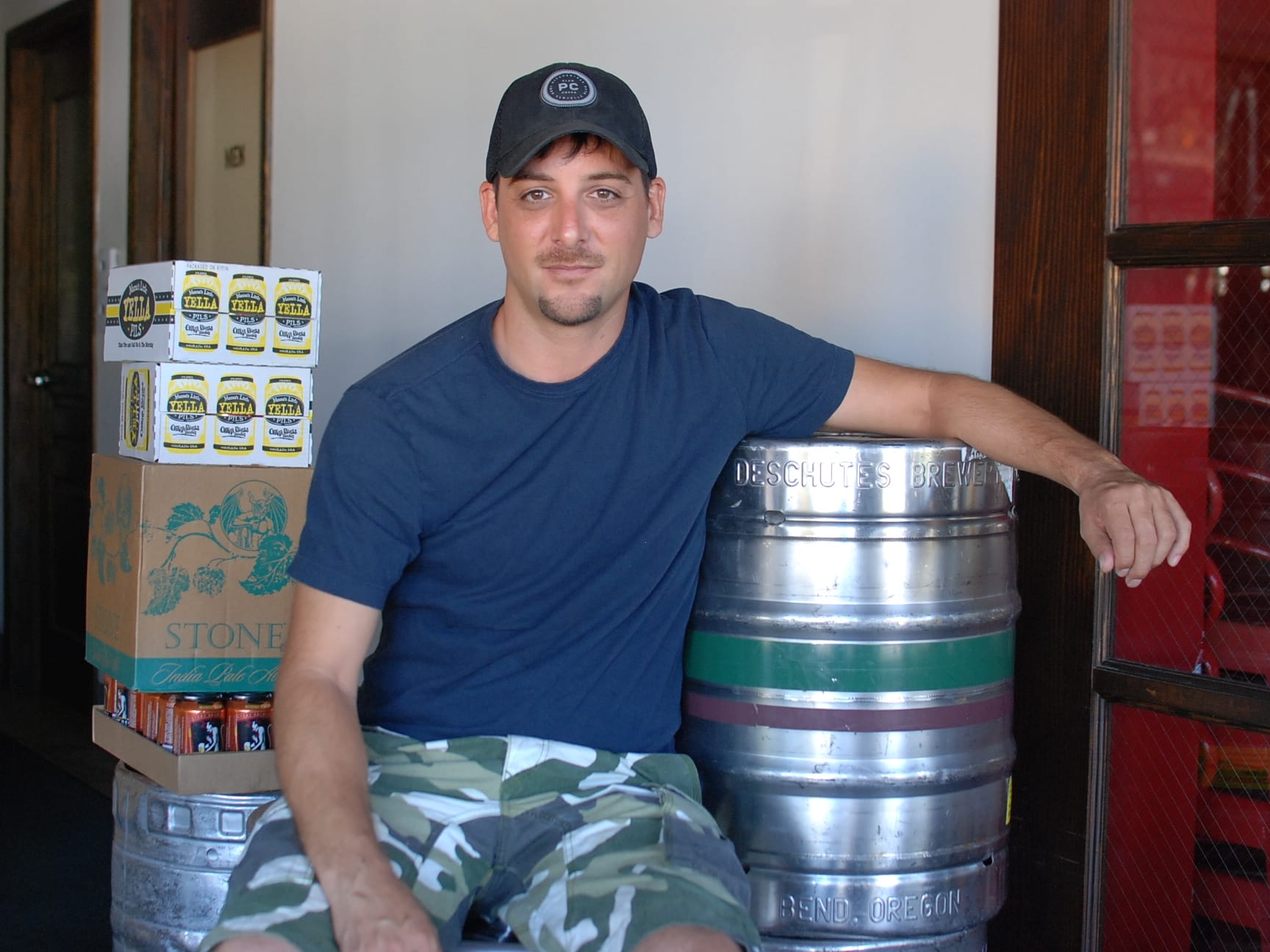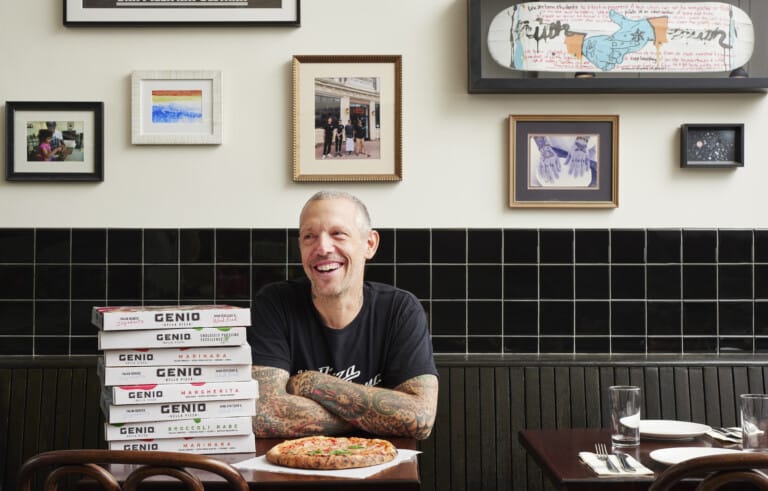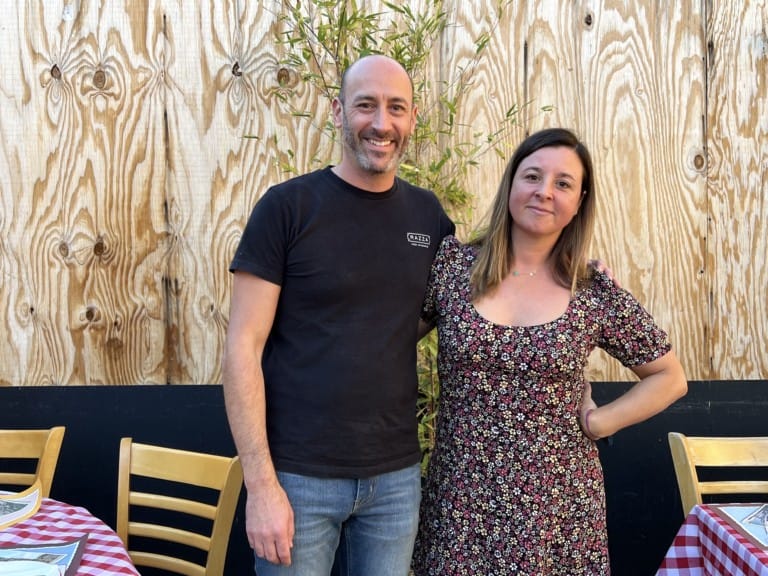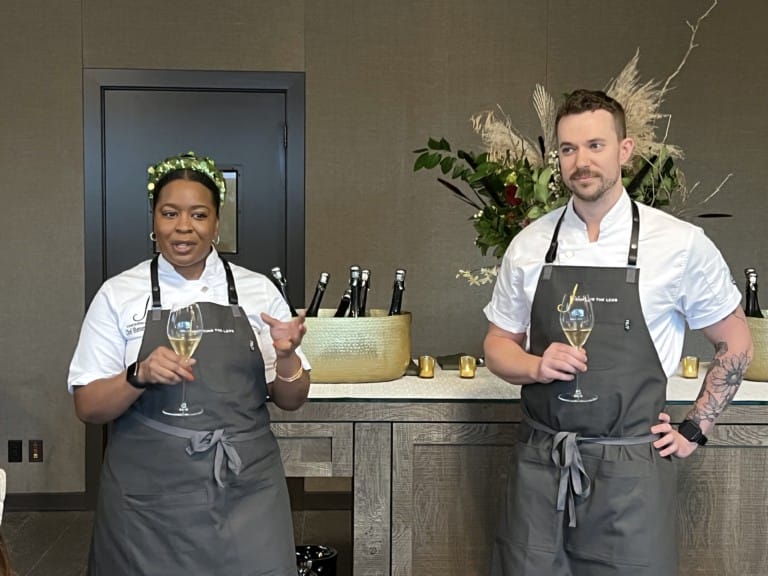Ernesto Uchimura was born in Argentina and moved to Los Angeles before his first birthday. He attended culinary school at Paul Smith’s College in upstate New York. He returned to L.A.’s Westside and climbed up the ranks in restaurants like Palomino and Napa Valley Grille. He helped Umami Burger get rolling and now is Plan Check‘s executive chef, and a partner with founder Terry Heller. Their progressive comfort food concept started in Little Osaka, expanded to Fairfax and has plans to open 1-2 units per year, with downtown third in line. I recently met Chef Uchimura at the original location, where he shared several insights.
Josh Lurie: Was it a given that you would become a chef, or did you consider other careers?
Ernesto Uchimura: I wanted to be an artist at one point. Then I thought I might be a mechanic at another time in life, and then I took a chance on going to culinary school and realized it was the right decision not too far into my training.
JL: What was the medium of art you enjoyed at that point?
EU: I enjoyed painting and drawing, but I realized I wasn’t as good as a lot of these super talented artists out there. I considered going to art school at one point, and after looking at a lot of my friends’ portfolios, I realized that it might be tough to get in, compared to how artistic and talented these guys are. So I kind of diverted my creative talents to another area.
JL: How do you feel like having an artistic eye helps you at Plan Check?
EU: Well you know, this job, a lot of it is creative. It’s not just creative in the food but you have to be creative in how you solve problems, how you approach different scenarios here, how you approach building out the restaurant, even how you manage systems and create systems takes creativity. So I think that’s really beneficial to me. I always tell my young chefs and my cooks, “You’ve gotta be a problem solver.” And how do you do that? You’ve got to think creatively, you’ve got to think deeply about these problems and figure out the best way to go about fixing them. There are always issues and I think that’s what makes a good chef or a good manager is how you solve those problems, and in order to do that, you really have to conceptualize how you’re going to do it.
JL: How did the Plan Check opportunity come about for you?
EU: I had just left Umami Burger, and my partner, Terry Heller, had this space here on Sawtelle, and it was just a shell of a bodega. He wanted to build a restaurant, and he wanted to call it Plan Check. He heard I was available and reached out to me through a mutual friend. That’s kinda how we hooked up. I came here, I looked at the space, I knew the area pretty well growing up in West Los Angeles and Culver City. I actually went to Japanese school here when I was a boy, so I knew I liked the area, I knew a lot about the area, and I thought a restaurant would work here depending on the concept. So I really looked around the neighborhood and was looking for the gaps in what was offered. I also realized I had a specialty in hamburgers and comfort food, so I thought, that could really work here. I partnered up with Terry at that point, he had the space, I had the concept, we came together and we created Plan Check.
JL: How did you end up at Paul Smith’s College?
EU: I have some family that lives up in that area. When I was thinking about what I wanted to do with my life, one of the options was to go live with my family up there and go to school. So I took that opportunity. The school was Paul Smith’s College and they had a culinary school. There was also hotel restaurant management and forestry.
JL: What was the very first professional restaurant kitchen that you worked in?
EU: My uncle, who’s a doctor and lives up there, had a doctor friend that he worked with who was an investor in a Ponderosa up there. So a week into culinary school, he got me a job at the Ponderosa.
JL: The steakhouse? What do you remember about your first night there?
EU: It’s funny, before I went off to culinary school I had broken my hand really bad skateboarding. My wrist snapped in half and it was totally ugly, so I had a cast on for the first couple months I was in culinary school. I couldn’t chop a vegetable. So they had me bussing tables first. Then when I went into a splint, I went to the dish station. Then from there they threw me on the grill. And then I remember getting crushed, I think it was my second or third night there, the other cook said,” Alright, I’m going home now,” and left me there. We got bum rushed, it was probably the first rush I ever had to work through, and I got murdered. But I liked it, I enjoyed it, I liked the energy. I liked the hustle, I’m drinking a pot of coffee, I’m banging out tickets, and it felt good. I felt like a man, you know. I was hooked at that point.
JL: What’s the progression once you got back to L.A.?
EU: I stayed up in New York for a little while, finished my culinary schooling there, worked at a couple more places up there, private chef in a hotel. Then I came back to Los Angeles and just kind of worked through different kitchens. Tick-tacked around, whatever stuck. I ended up at Palomino, which is in Westwood, and I stayed there for almost a year, and went on to Napa Valley Grille, which is also in Westwood…At Napa Valley I really attained my first true sous chef position. That was really the big starting point. I met my mentor there, Frank Fronda. After Napa Valley I just kind of worked around L.A. a little longer, I took a few chef jobs here, a few cook jobs there, and eventually landed a couple years later at Umami as a corporate executive chef.
JL: What does a dish have to be for it to go on your menu at Plan Check?









Leave a Comment